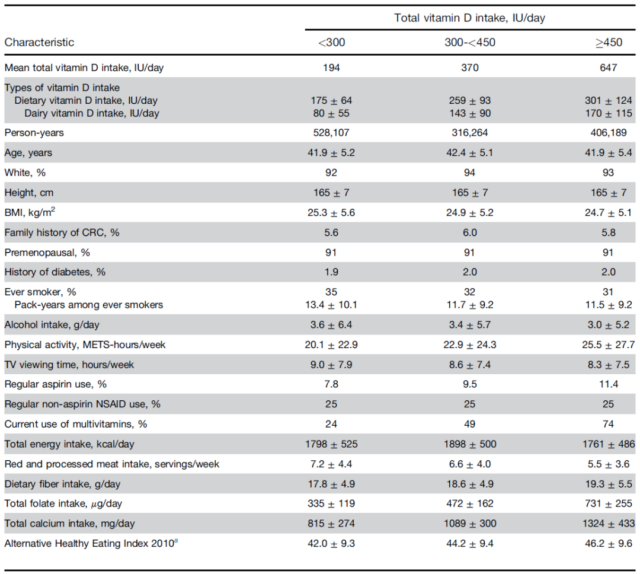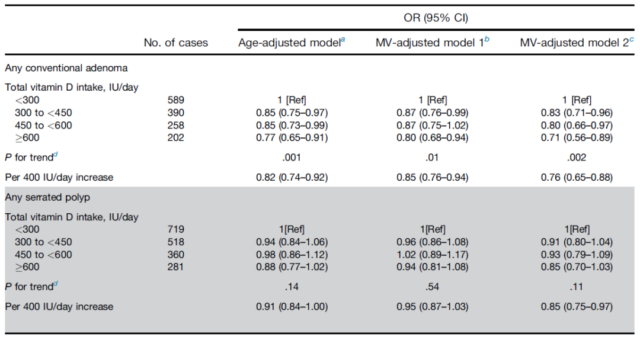Large-scale studies: Vitamin D can prevent colorectal cancer
- Normal Liver Cells Found to Promote Cancer Metastasis to the Liver
- Nearly 80% Complete Remission: Breakthrough in ADC Anti-Tumor Treatment
- Vaccination Against Common Diseases May Prevent Dementia!
- New Alzheimer’s Disease (AD) Diagnosis and Staging Criteria
- Breakthrough in Alzheimer’s Disease: New Nasal Spray Halts Cognitive Decline by Targeting Toxic Protein
- Can the Tap Water at the Paris Olympics be Drunk Directly?
Large-scale studies have shown that vitamin D can prevent colorectal cancer, and the effect is better in food
Large-scale studies: Vitamin D can prevent colorectal cancer. Although the overall incidence of colorectal cancer has been declining, the number of cases among young people is increasing. It is estimated that by 2030, nearly 11% of colon cancer and 23% of rectal cancer will occur in American adults under the age of 50.
Because a significant proportion of patients with early-onset colorectal cancer do not have a family history of colorectal cancer or a known genetic syndrome, changes in lifestyle factors and diet patterns are considered to be the reasons for the increased incidence of early-onset colorectal cancer.
The Nurses’ Health Study (NHS) II is a prospective cohort study of nurses between 25 and 42 years old started in 1989. A questionnaire survey of these women on demographics, diet and lifestyle factors, as well as medical and other health-related information is conducted every two years. Recent studies in this cohort have confirmed a significant association between sedentary and obesity and an increased risk of early-onset colorectal cancer, indicating that at least some well-known traditional colorectal cancer risk factors may also lead to early colorectal cancer.
In the past few decades, people’s intake of vitamin D-rich fish, mushrooms, eggs and milk has decreased a lot. There is increasing evidence that there is an association between vitamin D and the risk of death from colorectal cancer. However, it is unclear whether total vitamin D intake is associated with the risk of young-onset colorectal cancer.
Recently, the research team of Harvard University’s T.H. Chan School of Public Health published a research paper titled: Total Vitamin D Intake and Risks of Early-Onset Colorectal Cancer and Precursors in the top academic journal Gastroenterology in the field of gastroenterology.
This work prospectively studied the relationship between the total vitamin D intake of 94,205 young women registered in NHS II and the risk of early-onset colorectal cancer and pre-disease, and found that more vitamin D intake (mainly from Dietary sources) may help prevent young-onset colorectal cancer or precancerous colon polyps. Therefore, intake of more vitamin D is expected to be a prevention strategy for colorectal cancer for adults under 50.


The research team found 111 cases of young-onset colorectal cancer and 3317 cases of colorectal polyps from 94,205 women who were followed up from 1991 to 2015.
The median vitamin D intake is 372IU/day. Among women under the age of 50, those with a higher intake of vitamin D have a lower body mass index and are less likely to smoke, drink, watch TV, eat red meat and processed meat; consume more dietary fiber, total Folic acid and total calcium; use more aspirin and multivitamins; and are more likely to be physically active and have a healthy diet.

The increase in total vitamin D intake is associated with a decrease in the risk of early-onset colorectal cancer. Compared with women who consume less than 300 IU of vitamin D per day, women who consume between 300-450 IU of vitamin D per day have a risk ratio of 0.51, and those who consume more than 450 IU of vitamin D per day The hazard ratio for women is 0.49.

The research team also evaluated the difference between dietary vitamin D and supplemental vitamin D intake. Two sources of vitamin D intake are negatively correlated with early-onset colorectal cancer, but the correlation between dietary vitamin D (mainly from dairy products) is significant and stronger, which is higher than the correlation with vitamin D supplementation. This finding may be Due to accidental or unknown factors that are not yet understood.
The higher the total vitamin D intake, the lower the risk of early onset of conventional adenomas. Compared with women who consume less than 300 IU of total vitamin D per day, women who consume 600 IU per day have a lower risk of developing conventional adenomas.
Interestingly, the researchers did not find a significant association between total vitamin D intake and the risk of colorectal cancer diagnosed after the age of 50. The research results cannot explain this inconsistency, and it is necessary to conduct further studies on larger samples to determine whether vitamin D is actually more protective against younger-onset colorectal cancer.

In general, higher total vitamin D intake is associated with a lower risk of younger-onset colorectal cancer and pre-disease (adenoma or polyps). The research further supports the idea that vitamin D may be important for the health of young people and the prevention of colorectal cancer.
(source:internet, reference only)
Disclaimer of medicaltrend.org
Important Note: The information provided is for informational purposes only and should not be considered as medical advice.



